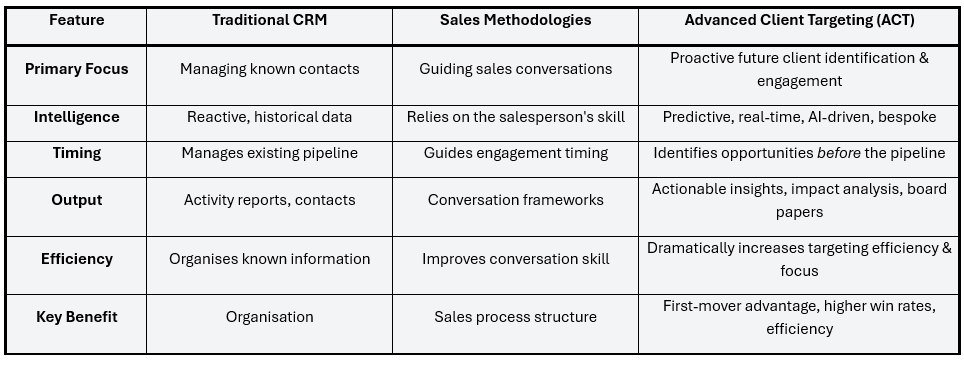
ACT vs. Alternatives: Why Traditional Tools Fall Short
Superior Insights: Unlocking UK Pension Market Opportunities
Advanced Client Targeting: The New Rules of B2B Sales
While CRM systems and established sales methodologies play a role in managing customer relationships and sales processes, they fundamentally differ from Advanced Client Targeting (ACT) in their approach and capabilities. ACT is not merely an enhancement; it represents a gigantic leap towards proactive, AI-driven B2B sales intelligence.
Limitations of Traditional CRM Systems
CRMs are primarily systems of record, designed to manage existing contacts, track interactions, and manage the sales pipeline after an opportunity has been identified. They excel at organisation but lack proactive intelligence:
- Reactive Focus: CRMs manage known leads and opportunities. They don't typically identify future clients before they enter the market.
- Limited Predictive Power: While some CRMs offer basic analytics, they lack the deep AI-driven analysis needed to predict which companies are about to need your services based on complex drivers and triggers.
- Data Silos: CRMs often rely on manually entered data or limited integrations, missing the broader context available from real-time news, financial filings, and market trends that ACT continuously monitors.
- Generic Insights: CRM reporting focuses on pipeline status and activity tracking, not on generating bespoke, board-ready impact assessments tailored to a specific prospect's situation.
In essence, CRMs help you manage the opportunities you already know about. ACT helps you discover the opportunities before anyone else does.

Shortcomings of Traditional Sales Methodologies
Methodologies like SPIN Selling, Challenger Sale, or Solution Selling provide valuable frameworks for structuring sales conversations and understanding customer needs. However, they rely heavily on the salesperson's ability to gather information and identify the right moment to engage:
- Manual Information Gathering: Salespeople spend significant time researching prospects, often relying on incomplete or outdated information.
- Timing Challenges: Identifying the exact right time to engage – when a prospect is genuinely ready for change – is often based on intuition or lagging indicators.
- Scalability Issues: Applying complex methodologies consistently and effectively across an entire sales team requires extensive training and individual skill, making expert-level execution difficult to scale.
- Lack of Proactive Triggers: Methodologies guide how to sell once engaged, but don't inherently provide the forward-looking intelligence to know who to engage next and why.
Sales methodologies equip your team for the conversation. ACT ensures they are having the right conversation, with the right prospect, at the right time, armed with unparalleled intelligence.

The ACT Advantage: Actionable, Customisable, Targeting
ACT transcends the limitations of traditional tools by focusing on proactive intelligence and tailored engagement:
- Actionable: ACT doesn't just provide data; it delivers expert-level, AI-driven assessments, quantified impact analyses, and board-ready proposals. It tells you why to engage and provides the materials to engage effectively.
- Customisable: The AI is trained on your specific business, solutions, and market context. The insights are tailored to your unique value proposition, unlike generic CRM data or methodology frameworks.
- Targeting: ACT's proprietary driver-and-trigger analysis identifies high-potential future clients months before they enter the traditional sales funnel, allowing you to build relationships and gain a crucial first-mover advantage.
Comparison Summary

Choose ACT to move beyond managing the present and start shaping your future sales success.